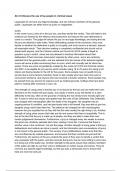Exam (elaborations)
WJEC Unit 3 Criminology AC 2.5 Discuss the use of lay people in criminal cases
- Module
- Crime Scene to Courtroom
- Institution
- WJEC
WJEC Unit 3 Criminology AC 2.5 Discuss the use of lay people in criminal cases Received an A for this exam. For personal use only, do not copy this work
[Show more]




